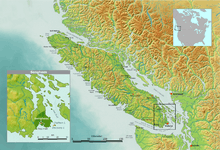Songhees
The Lekwungen or Lekungen nation (often called the Songhees or Songish by non-Lekwungens) are an Indigenous North American Coast Salish people who reside on southeastern Vancouver Island, British Columbia in the Greater Victoria area. Their government is the Songhees First Nation, a member of the Te'mexw Treaty Association and the Naut'sa Mawt Tribal Council. Their traditional language is Lekwungen, a dialect of the North Straits Salish language.

There is evidence of a fortified village existing at Finlayson Point in Beacon Hill Park prior to the arrival of Europeans in the late eighteenth and early nineteenth centuries. The Songhees' traditional foods included salmon, shellfish, whale, deer, duck, berries, camas root, and herbs. The Coast Salish traditionally lived in bighouses, which were large rectangular communal houses of cedar planks, adorned with carved and jointed totem posts.[1]
Pre-colonization
Before European contact much of the government was through a clan system, with twelve clans which each had its own fishing and hunting territory. Chiefship was hereditary in the male line and there were three castes - nobles, commons, and slaves. Like other north-west coast tribes they practiced potlatch and ceremonial gift distribution. The dead were buried in canoes or boxes upon the surface of the ground, or laid away in trees. Mentioning the names of a dead person was taboo.
Colonization
The Songhees population was estimated to be 8,500 in 1859, but by 1914 the population had decreased to less than 200.[2]
At the time of the establishment of Fort Victoria by the British in 1843, a Songhees village was situated adjacent to the fort. The village was subsequently moved across Victoria Harbour in what is now the Victoria West neighbourhood. The village was subsequently moved and a reserve established adjacent to what is now the municipality of View Royal. A traditional blessing in Lekwungen appears on a mural on the Ogden Point breakwater.[3]
Douglas Treaties
Sir James Douglas, governor of Vancouver Island negotiated a treaty with the Songhees in 1850. Much of the traditional territory of the Songhees now forms the core of the urbanized area of Victoria and surrounding municipalities. The development of British Columbia's capital city caused considerable disruption to the Songhees' traditional economy and livelihood.
Recently the Songhees considered that the government of British Columbia had failed to honour the 1850 treaty and commenced a legal action against the province and the government of Canada for redress. A settlement of the action was announced in November 2006 by Songhees Chief Robert Sam, the federal Minister of Indian Affairs and Northern Development, Jim Prentice, and the provincial Minister of Aboriginal Relations and Reconciliation, Mike de Jong.
See also
- Naut'sa Mawt Tribal Council
- Songhees First Nation
References
- Herbermann, Charles, ed. (1913). . Catholic Encyclopedia. New York: Robert Appleton Company.
- British Columbia from the earliest times to the present. Vol. 1, Charles Hill-Tout chapter The Native Races of British Columbia, in E.O.S. Scholefield & F.W. Howay, publ. S.J. Clarke, Vancouver, 1914, p.577
- Patterson, Travis (2011-06-01). "Traditional language comes alive on breakwater". Victoria News. Retrieved 2013-06-02.